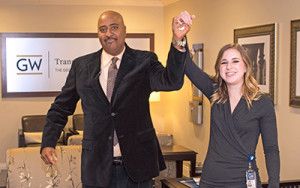SMHS donors provide “gift of life” to kidney patients in December 2016
At the George Washington University (GW) Transplant Institute in January 2017, Jose Reyes and Andrew Lewis stood in the waiting room. The two — each of whom had received a kidney from an anonymous donor in mid-December 2016 — watched as the door to the exam rooms opened.

“Meet your donor!” said J. Keith Melancon, M.D., chief of the Division of Transplant Surgery, director of the GW Transplant Institute at GW Hospital, medical director of the GW Ron and Joy Paul Kidney Center, and professor of surgery at the GW School of Medicine and Health Sciences (SMHS).
Lewis stepped back, visibly moved and struggling to form words when Jacob Lambdin, a third-year medical student at SMHS, approached.
“I’m speechless, but at the same time, I have so much I want to say,” Lewis said. “I am so grateful.”
Lambdin, who plans to pursue surgery, explained his decision to give his kidney to Lewis simply: “Whenever people ask why I decided to donate, I tell them ‘It’s a good thing to do, why not?’ ”
Reyes, meanwhile, didn’t believe who his donor was; he’d been convinced it was a man. Instead, Sarah Miknis, photographer and production assistant with Biomedical Communications at SMHS, walked out.
“You?” Reyes asked, as he enveloped Miknis in a hug.
Like Lambdin, Miknis felt compelled to donate. She’d been on a bone marrow list for years, but never got the call for a match. In the meantime, as an SMHS photographer, Miknis had covered many kidney screenings and health events, and decided that giving her spare organ to someone in need was the right thing to do.
“If I’m healthy and I can [help] somebody, I want to do it,” she said. “I have two kidneys, but I only need one.”
Donating, she added, wasn’t as hard a process as she’d anticipated — she had multiple screenings and was given ample time to consider her decision — and by winter, she was ready. Both she and Lambdin donated within a day of each other, effectively providing Lewis and Reyes with what Melancon termed “the gift of life.”
“With everything that’s going on in the world, the one thing I get asked all of the time is ‘why?’ ” Melancon continued. “All I can say is, ‘I don’t know, but it gives me faith in humanity.’ [When you donate,] you’re not giving a kidney. You’re saving a life.”



